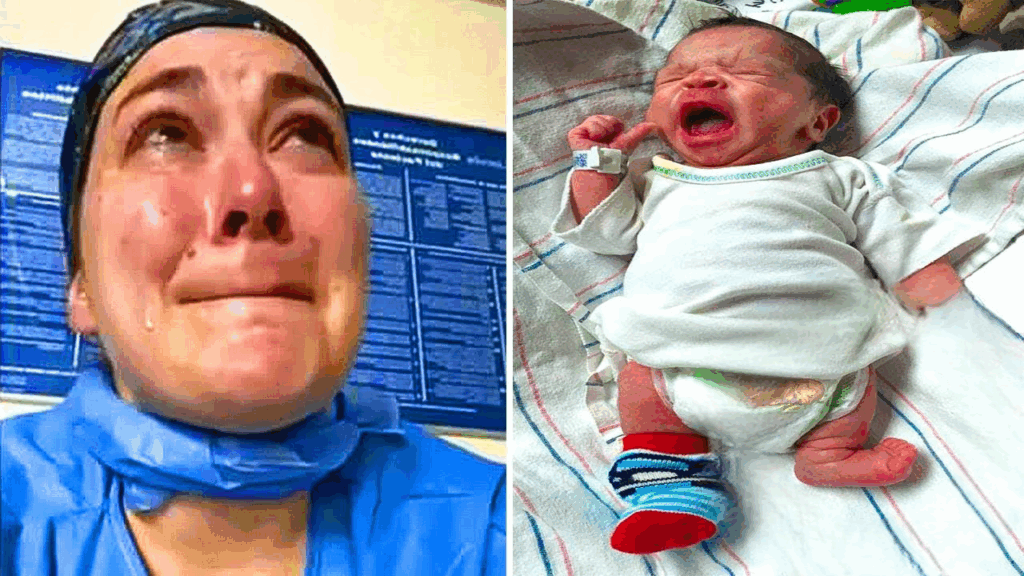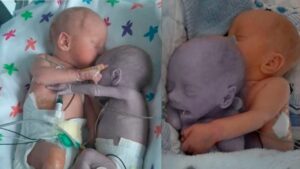The Hospital Had Never Seen Anything Like This Baby — But One Woman Was Desperate to Fight for Him By Staff Reporter | June 4, 2025 | Greenville, South Carolina

In the heart of Greenville Memorial Hospital, where miracles are often measured in milliliters and heartbeats per minute, a tiny baby named Elias has become a symbol of hope, resilience, and unconditional love. Born under the most extreme circumstances, his survival defied medical logic — but it was the compassion of one woman that gave him a fighting chance at life
On May 17, 2025, Baby Elias was born at just 23 weeks gestation — barely past the threshold of viability. Weighing only 14 ounces and measuring under 10 inches in length, he emerged into the world with almost no fat on his body and translucent skin. But what truly shocked the hospital staff was the rare and complicated combination of conditions Elias carried with him into the world.

He was born with a fused ribcage that restricted his breathing, underdeveloped lungs that could barely take in air, and a severe congenital heart defect that would typically result in death within minutes of delivery.
“We were prepared to say goodbye the moment he arrived,” said Dr. Michelle Avery, the hospital’s chief neonatologist. “Statistically, his chances of survival were almost nonexistent. His anatomy was unlike anything we had ever seen. But something about him… he just kept fighting.”
Elias’s survival for the first 24 hours baffled the medical team. And when he made it to 48 hours, then 72, the NICU scrambled to adjust his care plan in real time. There was no roadmap — Elias was writing it with each heartbeat.
While the medical team wrestled with the science, a quiet force was forming in the background.
Emma Castillo, a 33-year-old NICU nurse known for her calm demeanor and fierce dedication, had just finished a 12-hour shift when she heard about the birth. Though she wasn’t scheduled to return for two days, something pulled at her.
“When I heard the nurses whispering about ‘the miracle baby,’ I walked over just to peek. And then I saw him — so tiny, so fragile. I don’t know what happened in that moment, but I couldn’t leave,” Emma said.
Despite her own fatigue, she stayed. She spoke to Elias through the incubator walls, stroked his foot gently with a cotton swab, and whispered to him: “You’re not alone.”
Elias’s birth mother, a 19-year-old woman with no stable support system and a history of abuse, visited twice before choosing to relinquish her parental rights. “She was overwhelmed, and I don’t blame her,” Emma said softly. “She left Elias in our care, and in that moment, I decided I wasn’t going to let him go.”
Emma petitioned for temporary guardianship, which was granted within days.
In the three weeks since his birth, Elias has become the center of not only medical attention but an emotional movement. Doctors and nurses who once expected him to pass now monitor his tiny progress like lifelines: one more ounce gained, one more hour off the ventilator, one more eye flickering open.
Each milestone felt miraculous. At 10 days, Elias squeezed Emma’s finger. At two weeks, he reacted to light and began breathing with minimal machine support. Though still critically ill and in need of future surgeries, Elias was no longer a case — he was a survivor.
“He’s rewriting everything we thought we knew,” said Dr. Avery. “We’ve had national experts consult on his care. No one’s ever seen a baby with this combination of anomalies respond the way he has. It’s like his will to live is stronger than his diagnosis.”
News of Elias’s battle spread quickly after a local reporter covered his story. Within 48 hours, thousands had viewed a video of Emma reading to Elias at his bedside. Messages of support flooded in. Donations poured into a GoFundMe set up to support his medical costs and future needs.
Local high schools, churches, and businesses held fundraising events. Volunteers sent tiny clothes, blankets, and prayer cards. One artist painted Elias as a warrior surrounded by angels — a piece now hanging in the NICU hallway.
“He doesn’t have a biological family here, but he’s got an army behind him now,” said nurse practitioner Clara Holmes. “We’ve never seen anything like it.”
On June 3, after weeks of court proceedings and daily bedside devotion, Emma Castillo was officially granted custody of Elias. Her tearful hug with the judge became a viral moment — and a defining one for her new identity: mother.
“I didn’t give birth to Elias, but I chose him,” Emma said. “Every day. I choose to love him, to fight for him, to be his family.”
Emma is preparing for a long journey ahead. Elias will need at least three surgeries before his first birthday, including corrective procedures for his ribcage and heart. He’ll likely face developmental delays and require years of specialized care.
But Emma is undeterred.
“He didn’t quit. So I won’t either,” she said. “He’s my son now. And I’ll walk through anything for him.”
Elias’s story is far from over, but already it has touched hearts across the country. For the hospital staff, he’s a reminder that medicine is more than charts and machines — it’s about connection, love, and the mysterious power of human will.
“We were prepared for loss,” said Dr. Avery. “What we got instead was life. Raw, miraculous life.”





